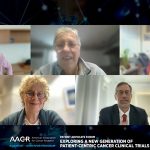-
Musical Toxicity an Effect of Cancer Treatment
Study finding cancer treatment affects ability to play or sing music highlights need for physical therapy, experts say.
by Kyle Bagenstose
-
Treatment Lags Behind Guidelines for Many Men With Prostate Cancer
Guidelines for treating advanced prostate cancer changed in 2017, but a recent study indicated many patients were not being treated accordingly.
by Laura Gesualdi Gilmore
-
Treating HER2-ultralow Breast Cancer
FDA approval expands treatment options for people with metastatic breast cancer that expresses minimal levels of HER2.
by Sandra Gordon
-
Lessons Learned as a Caregiver and Patient
After caring for her husband during his cancer treatment, Miriam Díaz-Gilbert was prepared to face her DCIS diagnosis.
by Miriam Díaz-Gilbert
-
Screening Options for People With Dense Breasts
Reports on breast density inform women of their status but raise questions about what to do next.
by Robin Roenker
-
Injection Immunotherapies Get FDA Approval
Giving immunotherapy drugs as injections, rather than intravenously, means patients can spend less time in the hospital or treatment center.
by Laura Gesualdi-Gilmore
-
Designing Clinical Trials for the Patient
Challenges in developing and studying treatments call for new ways of thinking about cancer research.
by Eric Fitzsimmons
-
Treating Smoldering Multiple Myeloma
A monoclonal antibody drug reduced the risk of smoldering myeloma progressing to multiple myeloma in patients at high risk for disease progression.
by Sandra Gordon
-
Immunotherapy Improves Survival in Bladder Cancer
New research indicates that adding immunotherapy to muscle-invasive bladder cancer treatment can improve event-free and overall survival.
by Laura Gesualdi-Gilmore
-
Cancer Patients Who Quit Smoking, Even Years After Diagnosis, Live Longer
Findings from a recent study support smoking cessation after diagnosis, with the most pronounced effect in those who received treatment within six months of diagnosis.
by Kyle Bagenstose
Cancer Talk
Lessons From 20 Years Living With Cancer
Multiple myeloma survivor Jonathan Gluck reflects on uncertainty, and the scientific progress that has kept him living with cancer for more than two decades.
by Eric Fitzsimmons
The Enduring Importance of Cancer Disparities ResearchOpening session from AACR conference highlights how perseverance and adversity have informed cancer disparities research over the years.
by Eric Fitzsimmons
Most Cancer Survivors Don’t Meet Healthy Diet GoalsDespite research linking fruits and vegetables to cancer survival, many people do not change their eating habits after diagnosis.
by Darlene Dobkowski
Many People Don’t Get Colonoscopy After Receiving Abnormal Blood TestsAbout half of people who receive abnormal results from colorectal cancer screening tests don’t follow up with a colonoscopy.
by Laura Gesualdi Gilmore














